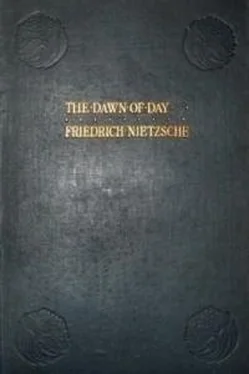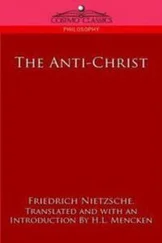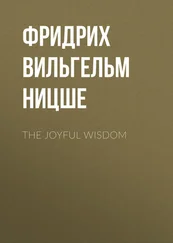The Dawn of Day
Friedrich Wilhelm Nietzsche
When Nietzsche called his book The Dawn of Day , he was far from giving it a merely fanciful title to attract the attention of that large section of the public which judges books by their titles rather than by their contents. The Dawn of Day represents, figuratively, the dawn of Nietzsche’s own philosophy. Hitherto he had been considerably influenced in his outlook, if not in his actual thoughts, by Schopenhauer, Wagner, and perhaps also Comte. Human, all–too–Human , belongs to a period of transition. After his rupture with Bayreuth, Nietzsche is, in both parts of that work, trying to stand on his own legs, and to regain his spiritual freedom; he is feeling his way to his own philosophy. The Dawn of Day , written in 1881 under the invigorating influence of a Genoese spring, is the dawn of this new Nietzsche. “With this book I open my campaign against morality,” he himself said later in his autobiography, the Ecce Homo .
Just as in the case of the books written in his prime— The Joyful Wisdom , Zarathustra , Beyond Good and Evil , and The Genealogy of Morals —we cannot fail to be impressed in this work by Nietzsche’s deep psychological insight, the insight that showed him to be a powerful judge of men and things unequalled in the nineteenth or, perhaps, any other century. One example of this is seen in his searching analysis of the Apostle Paul (Aphorism 68), in which the soul of the “First Christian” is ruthlessly and realistically laid bare to us. Nietzsche’s summing–up of the Founder of Christianity—for of course, as is now generally recognised, it was Paul, and not Christ, who founded the Christian Church—has not yet called forth those bitter attacks from theologians that might have been expected, though one reason for this apparent neglect is no doubt that the portrait is so true, and in these circumstances silence is certainly golden on the part of defenders of the faith, who are otherwise, as a rule, loquacious enough. Nor has the taunt in Aphorism 84 elicited an answer from the quarter whither it was directed; and the “free” (not to say dishonest) interpretation of the Bible by Christian scholars and theologians, which is still proceeding merrily, is now being turned to Nietzsche’s own writings. For the philosopher’s works are now being “explained away” by German theologians in a most naïve and daring fashion, and with an ability which has no doubt been acquired as the result of centuries of skilful interpretation of the Holy Writ.
Nor are professional theologians the only ones who have failed to answer Nietzsche; for in other than religious matters the majority of savants have not succeeded in plumbing his depths. There is, for example, the question of race. Ten years ago, twenty years after the publication of The Dawn of Day , Nietzsche’s countrymen enthusiastically hailed a book which has recently been translated into English, Chamberlain’s Foundations of the Nineteenth Century . In this book the Teutons are said to be superior to all the other peoples in the world, the reason given being that they have kept their race pure. It is due to this purity of race that they have produced so many great men; for every “good” man in history is a Teuton, and every bad man something else. Considerable skill is exhibited by the author in filching from his opponents the Latins their best trump cards, and likewise the trump card, Jesus Christ, from the Jews; for Jesus Christ, according to Chamberlain’s very plausible argument, was not a Jew but an Aryan, i.e. a member of that great family of which the Teutons are a branch.
What would Nietzsche have said to this legerdemain? He has constantly pointed out that the Teutons are so far from being a pure race that they have, on the contrary, done everything in their power to ruin even the idea of a pure race for ever. For the Teutons, through their Reformation and their Puritan revolt in England, and the philosophies developed by the democracies that necessarily followed, were the spiritual forbears of the French Revolution and of the Socialistic régime under which we are beginning to suffer nowadays. Thus this noble race has left nothing undone to blot out the last remnant of race in Europe, and it even stands in the way of the creation of a new race. And with such a record in history the Germans write books, eulogising themselves as the salt of the earth, the people of peoples, the race of races, while in truth they are nothing else than nouveaux–riches endeavouring to draw up a decent pedigree for themselves. We know that honesty is not a prerequisite of such pedigrees, and that patriotism may be considered as a good excuse even for a wrong pedigree; but the race–pandemonium that followed the publication of Mr. Chamberlain’s book in Germany was really a very unwise proceeding in view of the false and misleading document produced. What, it may be asked again, would Nietzsche have said if he had heard his countrymen screaming odes to their own glory as the “flower of Europe”? He would assuredly have dismissed their exalted pretensions with a good–natured smile; for his study of history had shown him that even slaves must have their saturnalia now and then. But as to his philosophical answer there can be no doubt; for in Aphorism 272 of The Dawn of Day there is a single sentence which completely refutes the view of modern racemongers like Chamberlain and his followers: “It is probable,” we read, “that there are no pure races, but only races which have become purified, and even these are extremely rare.” There are even stronger expressions to be met with in “Peoples and Countries” (Aphorism 20; see the Genealogy of Morals , p. 226): “What quagmires and mendacity must there be about if it is possible, in the modern European hotch–potch, to raise the question of ‘race’!” and again, in Aphorism 21: “Maxim—to associate with no man who takes any part in the mendacious race–swindle.”
A man like Nietzsche, who makes so little impression upon mankind in general, is certainly not, as some people have thought and openly said, a public danger, so the guardians of the State need not be uneasy. There is little danger of Nietzsche’s revolutionising either the masses or the classes; for, as Goethe used to say, “Seulement celui qui ressemble le peuple, l’émeut.” Nietzsche’s voice has as yet hardly been lifted in this country; and, until it is fully heard, both masses and classes will calmly proceed on their way to the extremes of democracy and anarchy, as they now appear to be doing. Anarchy, though, may be too strong a word; for there is some doubt whether, throughout Europe and America at all events, the people are not now too weak even for anarchy. A revolt is a sign of strength in a slave; but our modern slaves have no strength left.
In the meantime, however, it will have become clear that Nietzsche tried to stop this threatening degradation of the human race, that he endeavoured to supplant the morality of altruism—the cause of this degradation—by another, a super–Christian morality, and that he has succeeded in this aim, if not where the masses and the classes are concerned, at any rate in the case of that small minority of thinkers to which he really wished to appeal. And this minority is naturally grateful to the philosopher for having supplied them with a morality which enables them to be “good” without being fools—an unpleasant combination which, unfortunately, the Nazarene morality is seldom able to avoid. This Nazarene morality has doubtless its own merits, and its “good” and “evil” in many cases coincide with ours; but common sense and certain intellectual qualities are not too highly appreciated in the table of Christian values (see, for instance, 1 Cor. iii. 19), whence it will be observed that the enlightenment of a Christian is not always quite equal to his otherwise excellent intentions. We Nietzschians, however, must show that patience to them which they always pretend to show to their opponents. Nietzsche himself, indeed, recommends this in Aphorism 103 of this book, an aphorism which is almost too well known to need repetition; for it likewise disproves the grotesque though widely circulated supposition that all kinds of immorality would be indulged in under the sway of the “Immoralistic” philosopher:
Читать дальше











